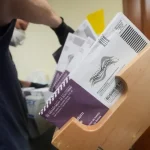

(The Center Square) – Mariner Finance has been sued by 11 attorneys general, including Pennsylvania’s Michelle Henry, amid accusations of unlawful business practices.
The lawsuit was first filed in 2022 and amended earlier this week in the U.S. District Court for the Eastern District of Pennsylvania. Mariner had sought earlier this year to have all claims dismissed.
The term often used in description is predatory lending. In most cases, it involves aggressive tactics and unfair loan terms like high-interest rates and fees. Not all are obvious at time of signing by borrowers.
The prosecutors say Mariner, headquartered in Baltimore with 55 locations in seven states, charged customers for “hidden add-on products that they either didn’t know about or didn’t agree to buy,” a release says. The lawsuit says Mariner employees didn’t mention the add-ons or misrepresented them when talking to consumers.
Mariner is accused of illegal sales tactics with new borrowers, including same-day check-in-hand lending. It uses the unsolicited “live checks” mailings to draw in new customers, prosecutors say.
In 2019, Mariner charged consumers $121.7 million nationwide in premiums and fees for add-on products.
“This mega lending company preyed on and deceived consumers by hiding fees and costs for products, while illegally soliciting existing borrowers who already were struggling to afford payments to take on even more debt,” Henry said.
Mariner is owned by a Wall Street private equity fund managed by Warburg Pincus.
In prosecutors’ request for relief, Mariner is being asked to stop charging consumers for add-on products, and to cease other harmful practices.
Additionally, Mariner is asked to make full restitution to borrowers; repay unlawfully gained profits; be assessed civil penalties; rescind or reform all contracts or loan agreements with consumers affected by the company’s unlawful practices.
Henry leads the list of attorneys general that in the first filing included the District of Columbia, New Jersey, Oregon, Utah and Washington. The amended complaint now includes Illinois, Indiana, New York, North Carolina, Tennessee and Wisconsin.







